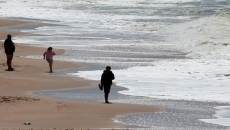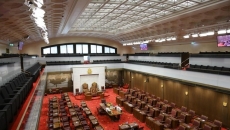Proposals for new mines, power plants, pipelines or railways in Canada will have to include plans to hit "net zero" emissions by 2050 if they have any hope of getting approved.
But the new rules, contained in the government's final strategic assessment on climate change released Thursday, are not the all-encompassing climate test environment groups had been hoping to see.
Environment Minister Jonathan Wilkinson said the plan will ensure Canada's goal to exceed its Paris climate agreement targets by 2030 and then hit net zero by 2050.
"Net zero" means any greenhouse gases emitted are absorbed by natural or mechanical means, rather than left to amass in the atmosphere where they contribute to global warming.
"We made a commitment in 2015, and implemented in the last mandate, of better rules for assessing large projects," Wilkinson said. "Today what we're doing is providing clarity to project proponents."
The Impact Assessment Act was passed before the last election to overhaul how federal environmental assessments are done. A long list of projects, from mines and power lines to wind farms, airports, and pipelines, automatically require those assessments. The environment minister can also insist a federal assessment be done even on some projects not on that list.
In addition to putting time constraints on the review periods, including Indigenous expertise and consultation in the process, and adding a pre-review consultation process, the Impact Assessment Act for the first time will include a project's effect on climate change as one of the considerations.
The report released Thursday outlines how that will happen. It requires project proposals to include the greenhouse-gas emissions to be produced from construction and operations and what efforts are being made to minimize emissions.
For any project that will still be operating in 2050, a plan to get to net zero is also required.
"It is important that the assessment of projects is consistent with Canada's commitment to achieving a net-zero future by 2050," said Wilkinson.
"Which, as I say, reinforces the message that the government has been saying that climate change is real, it's important, we need to address it."
A net-zero plan will be one of the enforceable conditions put on a project if it is approved, but there are no details about how such a plan would be measured or enforced.
Julia Levin, the climate and energy program manager at Environmental Defence, said she is disappointed with the rules. Not only do they fail to put any specific requirements for projects to be in line with Canada's 2030 climate goals, the new rules only require projects that will operate after 2050 to have those net-zero plans.
"This is not a climate test," she said.
Levin said under these rules a coal mine that wants to operate for the next 25 years could contribute emissions to the atmosphere for a quarter-century and not have to show a plan for reducing emissions.
She also noted that there is nothing requiring an assessment of the emissions that will be produced downstream — like when oil in a new oilsands mine is refined and burned to drive cars, or when coal is burned to make electricity.
Wilkinson is in the midst of reconsidering whether to order a federal assessment of the proposed Vista coal mine expansion in Alberta, which is producing coal entirely for export.
He said Thursday there is some merit to considering the global impacts of exporting coal from Canada and an assessment of thermal coal as a whole is underway to determine if Canada should adjust how it assesses new coal projects.
"There is a legitimate question about the future of thermal coal in this country," said Wilkinson.
But he said the climate-change assessment is not requiring reports on what emissions Canadian-made products may create in other countries because those emissions are the responsibility of the nation where they are produced.
The new assessment rules apply to new projects beginning the review process.






